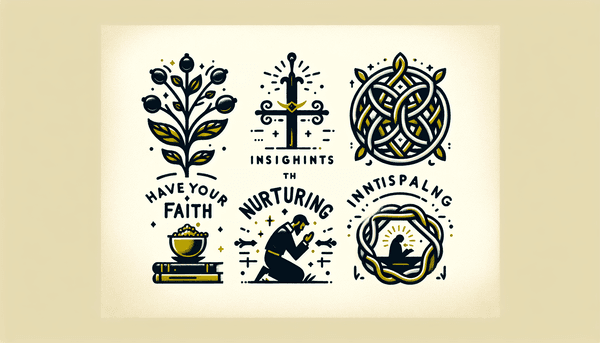Understanding the End Times
As Jesus spoke to His disciples on the Mount of Olives, He described the harbingers of the end times. In Matthew 24:3-14, He mentions wars, famines, earthquakes, false prophets, and the increase of wickedness as signs preceding the apocalypse. However, despite the vivid descriptions, Jesus emphasized that the exact timing remains solely in the knowledge of God, reminding us that 'no one knows the day or hour' (Mark 13:32). This unpredictability calls for a steadfast faith and the perseverance of believers, as 'the day of the Lord will come like a thief' (2 Peter 3:10), and we are urged to live in a state of readiness and spiritual vigilance.
The Bible and Mental Health
The Bible does not shy away from the topic of mental health, offering numerous accounts of individuals facing various forms of suffering. Through these stories, God's compassion for those in distress shines through. In the Gospel of Luke, Jesus proclaimed, 'The Spirit of the Lord is on me, because he has anointed me to proclaim good news to the poor... to set the oppressed free' (Luke 4:18). This declaration includes the liberation from mental and emotional bondage, emphasizing the importance of compassion and mutual support. Believers are encouraged to 'cast all [their] anxiety on [God], because he cares for [them]' (1 Peter 5:7), and to find solace in the Lord, who is 'close to the brokenhearted' (Psalm 34:18).
Responding to Anger and Hostility
The book of Proverbs offers profound wisdom on navigating anger and hostility with a gentle spirit. 'A gentle answer turns away wrath, but a harsh word stirs up anger' (Proverbs 15:1). As followers of Christ, we are called to seek God's justice rather than taking matters into our own hands. Romans 12:19 reminds us, 'Do not take revenge, my dear friends, but leave room for God’s wrath.' By living peaceably with others and overcoming evil with good, we reflect the transformative love of God and fulfill the command to 'love your enemies' (Matthew 5:44), illustrating the power of forgiveness and reconciliation.
Conclusion
The Bible's timeless teachings continue to speak into our lives, offering direction and hope across a vast array of human experiences. Whether considering the end of days, grappling with mental health, embracing new beginnings, dealing with difficult people, or seeking deeper wisdom, Scripture provides a wellspring of guidance. For believers and seekers alike, these biblical principles stand as beacons of light, illuminating the path ahead and encouraging us to persevere with faith, hope, and love in the face of life's challenges.
FAQ
Q: How will we know when the apocalypse has started?
A: As described in Matthew 24:3-14, Jesus mentions several signs like wars, famines, earthquakes, and the rise of false prophets, but the exact timing is known only by God.
Q: Can you share a passage from the Bible to inspire hope?
A: Certainly, the Beatitudes from Matthew 5 are a source of inspiration, offering blessings to those who embody virtues such as humility, mercy, and peacemaking.
Q: What guidance does the Bible offer for dealing with anger and hostility?
A: Proverbs advises responding with gentleness, as 'A gentle answer turns away wrath' (Proverbs 15:1), and the New Testament encourages believers to overcome evil with good (Romans 12:21).
Q: How does the Bible address the stigma of mental health?
A: The Bible shows God's compassion for those suffering mentally, encouraging support for one another and finding comfort in God, as seen in Psalm 34:18 and 1 Peter 5:7.






